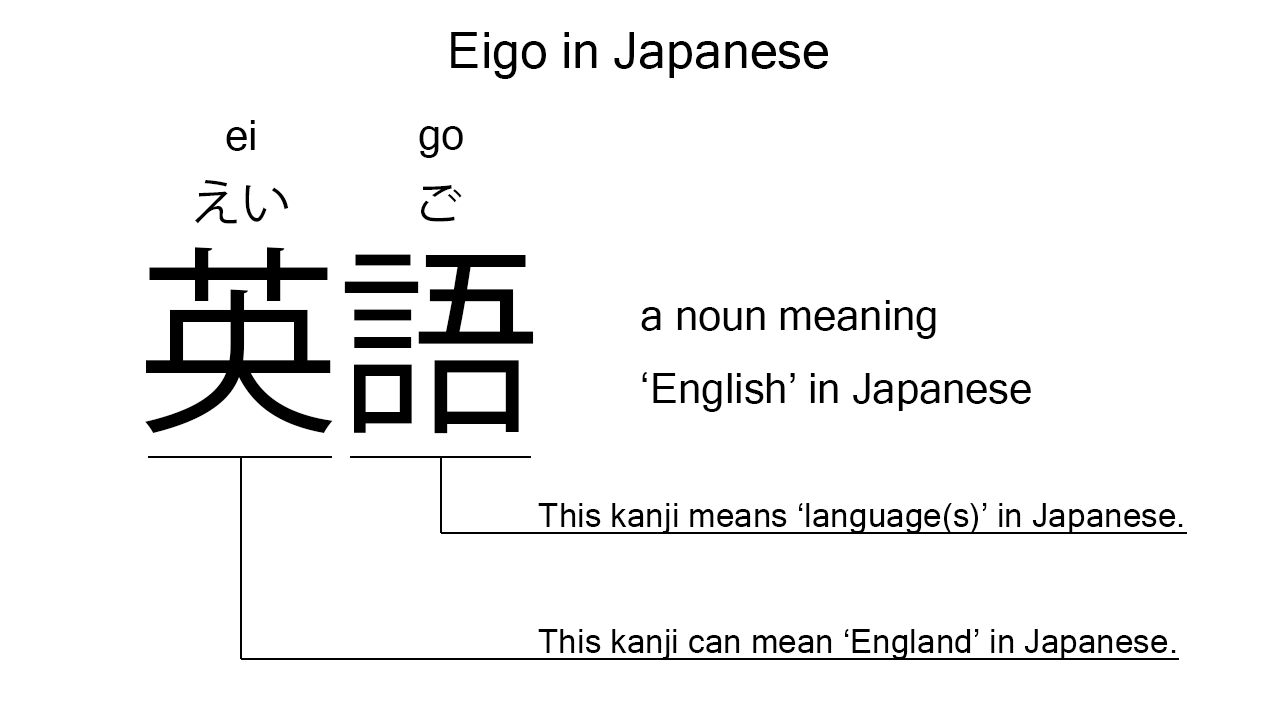What does “eigo” mean in Japanese?
Native speakers use eigo to mean ‘English’ or more specifically ‘the English language’ in Japanese. Perhaps, some Japanese learners know this word as it is sometimes used in Japanese conversations. In this blog post, however, I will explain this word in detail based on its kanji expression. And also, I will explain how to use it through example sentences. My explanations would help Japanese learners understand eigo more clearly. Then, let’s get started!
Contents
Definition and meanings of “eigo”
Let me start with the definition and meanings of eigo.
- eigo – 英語 (えいご) : a noun meaning ‘English’ or more specifically ‘the English language’ in Japanese.
Normally, Japanese native speakers use this noun to refer to English, but it can also cover American English, Canadian English, Australian English, and so on. The languages originally coming from England are just called eigo.
The definition and meanings are not that difficult, I think. To understand this noun more clearly, however, let me explain its kanji characters in detail, one by one.
Eigo in kanji
The kanji expression of eigo consists of the following two kanji characters:
- 英 : a kanji character occasionally used to mean ‘England’ or ‘Britain’ in Japanese.
- 語 : a kanji character used to mean a ‘language’ in Japanese. This kanji can also be found in other words like nihongo.
From these two kanji characters, we can understand that eigo literally means ‘the languages from England’ in Japanese. This literal interpretation is completely in line with the actual meanings, I think.

When we meet new kanji expressions, we should check their characters in detail to understand their meanings clearly and deeply. In many cases, kanji characters tell us a lot about the meanings of the expressions they form. Actually, here, we could get the better understanding of eigo through the detailed kanji check above.
So far, I’ve explained the definition and meanings of eigo together with its kanji characters. Then, let me explain how to use it through the example sentences below.
How to say “English” in Japanese
boku tachi wa eigo ga suki desu – 僕達は英語が好きです (ぼくたちはえいごがすきです)
We love English.
Below are the new words used in the example sentence.
- boku – 僕 (ぼく) : a pronoun meaning ‘I’ in Japanese. This is used mainly by boys and young males.
- tachi – 達 (たち) : a suffix used after a noun or pronoun to make its plural form. In the example, this is used after boku to make its plural form, boku tachi, which means ‘we’ in Japanese. Learn more about Japanese plural.
- wa – は : a binding particle working as a case marker or topic marker. In the example, this works after boku tachi to make the subject in the sentence.
- ga – が : a case particle used to make the subject word or the object word in a sentence. In the example, this is used after eigo to make the object in the sentence.
- suki – 好き (すき) : the stem part of the na-adjective, sukina, which means ‘favorite’ in Japanese. Native speakers, however, often use this as an individual word to mean ‘to like’ or ‘to love’ in Japanese. In this example, this is used to mean ‘to love’ in Japanese.
- desu – です : an auxiliary verb used after a noun or adjective to make it polite. Probably, this is well known as a part of Japanese desu form. In the example, this is used after suki to make it sound polite.
This is a typical usage of eigo. In this example, it works together with the case particle, ga, to become the object in the sentence.
Another example of “eigo”
kanojo wa eigo ga totemo jouzu desu – 彼女は英語がとても上手です (かのじょはえいごがとてもじょうずです)
She is very good at English.
Below are the new words used in the example sentence.
- kanojo – 彼女 (かのじょ) : a pronoun meaning ‘she’ in Japanese.
- totemo – とても : an adverb of degree meaning ‘very’, ‘much’, ‘so’, or such in Japanese. In the example, this works in front of jouzu to emphasize its meaning.
- jouzu – 上手 (じょうず) : a noun, but often used as the stem part of the na-adjective, jouzuna, which means ‘good (at something)’ in Japanese.
This is another example of eigo. In this example, it works as a part of the commonly-used phrase, eigo ga totemo jouzu, which means ‘to be very good at English’ in Japanese. This phrase can work alone especially in speaking to mean, for example, ‘your English is very good’ in Japanese. It’s worth knowing, I think.
By the way, wa in this example works as a topic marker to put a focus on kanojo, so the original meaning of the Japanese sentence is more like ‘for her, her English is very good.’ It has been translated more naturally as ‘she is very good at English’, though.
Summary
In this blog post, I’ve explained the definition and meanings of eigo in detail based on its kanji expression. And also, I’ve explained how to use it through the example sentences. Let me summarize them as follows.
- eigo – 英語 (えいご) : a noun meaning ‘English’ or more specifically ‘the English language’ in Japanese. Normally, Japanese native speakers use this noun to refer to English, but this can also cover American English, Canadian English, Australian English, and so on. The languages originally coming from England are just called eigo. These two kanji characters literally mean ‘the languages from England’ in Japanese. This literal interpretation is completely in line with the actual meanings, I think.
Hope my explanations are understandable and helpful for Japanese learners.
Leave a Reply